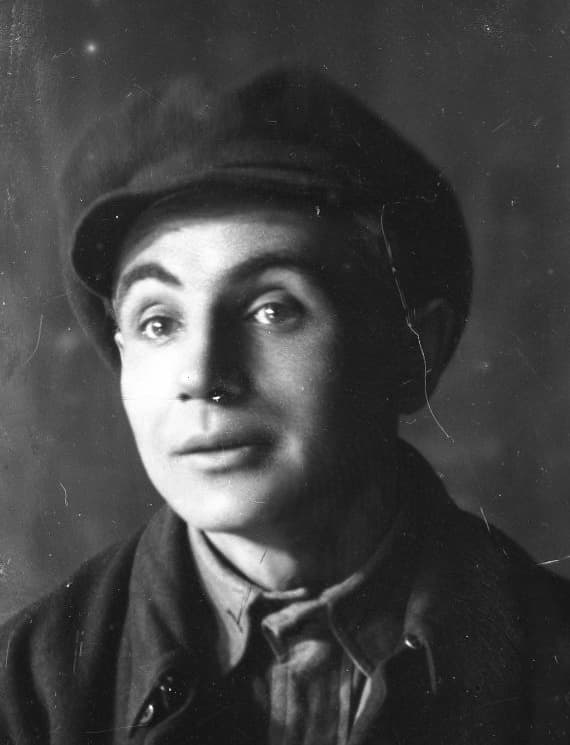May 29, 1899 – September 3, 1937
Favst Lopatynskyi was a Ukrainian theater actor, film and theater director, screenwriter, member of the Berezil Artistic Association, and colleague of Les Kurbas. He was born in Lviv to actress and opera singer Filomena Lopatynska and actor and director of the Ruska Besida Theater Lev Lopatynskyi. At age sixteen he started acting at the Ruska Besida Theatre and working with Les Kurbas. He would be part of his theater – from Ternopil Theatrical Evenings to Berezil – for the coming years.
He was among the first members of Berezil, where he taught, was part of the first director’s laboratory (at one of the meetings Kurbas called him “the only graduate”) and part of the directing team. He headed the second experimental working troupe. The second workshop started on December 30, 1922 and had its first (and last) performance on November 7, 1923. He made his directorial debut with The New Ones Advance, based on Efim Zozulya’s short story. He took a radical approach to the production, preferring “the destruction of psychologism and replacing a boring experience with an interesting trick.” Audiences and critics took notice of this show and his second directorial work – Ernst Toller’s The Machine Wreckers (1924). The next was Marko Kropyvnytskyi’s They Made Fools of Themselves. Lopatynskyi did it in the style of an improvised circus performance, complete with clowns and acrobats. Playwright Volodymyr Yaroshenko modernized the text and added aspects of Soviet life. At the First State Theater for Children In 1926 Lopatynskyi put on Kozak Holota, based on Zalitskyi’s play Robin Hood, and the duma About Cossack Feska Hanzha Andyber. In 1927 Lopatynskyi stages his last performance with Berezil – Ivan Karpenko-Karyi’s Sava Chalyi. The reviews were mixed, given the nature of the original source, the complex image of the hero and reference to painful issues of national history.
In 1926 Lopatynskyi made his cinematic directorial debut with The Blue Package, based on K. Hain’s adventure story In the Name of Discipline. The screenplay was co-written by futurist poet Geo Shkurupii and director Hnat Ihnatovych. Critics liked the action-packed film about rural rebels. Lopatynskyi’s second film was supposed to be the grotesque comedy Vasia the Reformer – Oleksandr Dovzhenko’s debut as a screenwriter. However, Lopatynskyi left because of a conflict with the production team and it was completed by screenwriter and cinematographer Joseph Rona. Lopatynskyi’s best film was Vasylyna (1927), an adaptation of Ivan Nechui-Levytskyi’s Burlachka, written by Mykhailo Yalovyi. The authors shifted the ideological emphasis while preserving most of the plot: in the film, a disgraced country girl starts a new life by working in a factory. In 1929 he directed the adventure film Judge Reitan (or The Double) about the Romanian revolutionary underground’s struggle against the police. Next the director had planned to film Ivan Franko’s novel Zakhar Berkut, but it never happened. 1931 saw the release of Karmaliuk – an adventure film about the legendary outlaw and folk hero. The director goes on to make Height #5, written by Vadym Okhrymenko (1931) about a common theme in the 1930s – eliminating “breaks” in production and countering kulak saboteurs. Next Lopatynskyi directs Ivan Le’s The Mizhhiria Novel, works for some time in popular science cinema (Home Repairs On The Go), and later becomes a screenwriter.
Together with Yurii Mokrii he writes the script for Hnat Holyi, a film about the Koliivshchyna haidamaka rebellion. In 1932 he creates Ukraina – a harsh critique of Soviet realities.
Разом із Юрієм Мокрієвим пише сценарій фільму «Гнат Голий» на матеріалі Коліївщини, у 1932 році створює «Україну» з гострою критикою радянської дійсності.
In 1937 Lopatynskyi was sentenced to death on charges of being a spy and a member of the “counter-revolutionary Ukrainian Military Organization” and for making “terrorist statements.” In 1962 Lopatynskyi was rehabilitated by the Judicial Board for Criminal Cases of the Supreme Court of the Ukrainian SSR and the case against him was closed.


